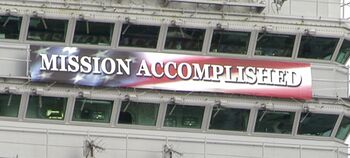Difference between revisions of "American fascism"
Jump to navigation
Jump to search
(start) |
(picture) |
||
| (One intermediate revision by the same user not shown) | |||
| Line 1: | Line 1: | ||
{{concept | {{concept | ||
| − | |image= | + | |image=Mission Accomplished banner on the USS Abraham Lincoln.jpg |
| − | |image_width= | + | |image_width=350px |
|image_caption= | |image_caption= | ||
|wikipedia= | |wikipedia= | ||
|constitutes=Fascism | |constitutes=Fascism | ||
|description= | |description= | ||
| + | }} | ||
| + | |||
| + | {{SMWQ | ||
| + | |text=If we define an American fascist as one who in case of conflict puts money and power ahead of human beings, then there are undoubtedly several million fascists in the United States. There are probably several hundred thousand if we narrow the definition to include only those who in their search for money and power are ruthless and deceitful. Most American fascists are enthusiastically supporting the war effort. They are doing this even in those cases where they hope to have profitable connections with German chemical firms after the war ends. They are patriotic in time of war because it is to their interest to be so, but in time of peace they follow power and the dollar wherever they may lead. | ||
| + | |subjects= | ||
| + | |authors=Henry A. Wallace | ||
| + | |date=April 9, 1944 | ||
| + | |source_details=New York Times | ||
| + | |source_URL=http://web.archive.org/web/20051228112452/http://newdeal.feri.org/wallace/haw23.htm | ||
}} | }} | ||
Latest revision as of 21:39, 10 October 2021
(Fascism) | |
|---|---|
 | |
| Interest of | • Smedley Butler • John W. Whitehead |
“If we define an American fascist as one who in case of conflict puts money and power ahead of human beings, then there are undoubtedly several million fascists in the United States. There are probably several hundred thousand if we narrow the definition to include only those who in their search for money and power are ruthless and deceitful. Most American fascists are enthusiastically supporting the war effort. They are doing this even in those cases where they hope to have profitable connections with German chemical firms after the war ends. They are patriotic in time of war because it is to their interest to be so, but in time of peace they follow power and the dollar wherever they may lead.”
Henry A. Wallace (April 9, 1944) [1]
External links
- Fascism, American Style - commentary by John W. Whitehead (2016)
Related Quotations
| Page | Quote | Author | Date |
|---|---|---|---|
| Death squad | “[...] in country, after country, after country, of our allies, or our client states in the third world, you've find that the CIA helped put in power the dictator, or reinforced someone who had just gotten into power, train their police, train them in oppression, suppression of the people [which includes heavy torture techniques as was discussed shortly before in the conversation] and it worked for a decade, a decade and a half, sometimes for twenty years [...] (25:20)” | John Stockwell | 1980 |
| Michael Ledeen | “Every ten years or so, the United States needs to pick up some small crappy little country and throw it against the wall, just to show the world we mean business.” | Michael Ledeen | |
| Michael Ledeen | “The hunt for the terrorists is a technical matter, and we must hope that our military has enough virtue left from the Clinton ravages to do the job. But we should have no misgivings about our ability to destroy tyrannies. It is what we do best. It comes naturally to us, for we are the one truly revolutionary country in the world, as we have been for more than 200 years. Creative destruction is our middle name. We do it automatically, and that is precisely why the tyrants hate us, and are driven to attack us.” | Michael Ledeen | 20 September 2001 |
| The Georgetown Set | “In long exchanges, heated by intellectual passion and alcohol, their vision of a new world order began to take shape. Internationalist, abrasive, competitive, these men had an unshakeable belief in their value system, and in their duty to offer it to others. They were the patricians of the modern age, the paladins of democracy, and saw no contradiction in that. This was the elite which ran American foreign policy and shaped legislation at home. Through think-tanks to foundations, directorates to membership of gentlemen's clubs, these mandarins were interlocked by their institutional affiliations and by a shared belief in their own superiority.” | Frances Stonor Saunders |
Many thanks to our Patrons who cover ~2/3 of our hosting bill. Please join them if you can.